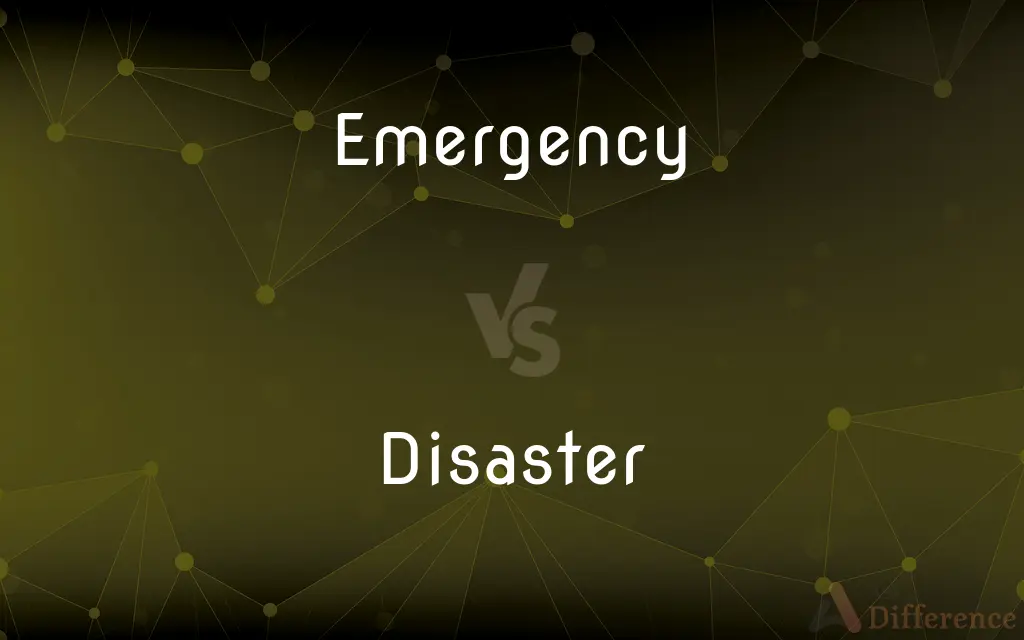Emergency vs. Disaster — What's the Difference?
By Maham Liaqat & Urooj Arif — Updated on April 26, 2024
"Emergency" refers to a sudden, urgent situation requiring immediate action, often to prevent worsening conditions; "disaster" describes a severe, often sudden event causing widespread damage, destruction, and distress.

Difference Between Emergency and Disaster
Table of Contents
ADVERTISEMENT
Key Differences
An emergency is characterized by the need for quick response to prevent further harm or to manage a situation that poses an immediate risk, such as a medical emergency or a fire. It demands immediate action to mitigate the situation and is typically localized, though it can be part of a broader disaster. On the other hand, a disaster refers to an event that has already caused significant destruction, such as natural disasters like hurricanes or human-caused disasters like nuclear accidents.
While emergencies can often be contained or managed with prompt and effective response, disasters are typically larger in scale and require long-term recovery efforts. Emergencies can escalate into disasters if not managed properly, indicating a progression in severity and scope.
The term "emergency" focuses on the urgency and response aspects, highlighting the immediate actions necessary to handle the situation. In contrast, "disaster" emphasizes the aftermath and impact, often involving a recovery phase that addresses the extensive damages and disruptions caused.
Emergency services (such as medical, fire, and police) are designed to respond to emergencies, providing rapid assistance to prevent situations from becoming worse. Disaster response, however, involves a broader spectrum of activities, including humanitarian aid, reconstruction, and support to rebuild and recover from the extensive damages.
"Emergency" can describe any high-priority situation needing urgent attention in various contexts (like a business or personal emergency), whereas "disaster" is often used to denote a significant failure or catastrophe in diverse fields, such as finance or relationships.
ADVERTISEMENT
Comparison Chart
Definition
A sudden, urgent situation needing immediate action
A severe event causing widespread damage
Scope
Can be localized or part of a larger issue
Often extensive and widespread
Response
Immediate action to mitigate
Long-term recovery and rebuilding needed
Examples
Medical emergencies, fires
Earthquakes, floods, nuclear accidents
Focus
Urgency and immediate response
Aftermath, impact, and recovery
Compare with Definitions
Emergency
Pertains to quick response scenarios.
Emergency services arrived within minutes of the call.
Disaster
A significant event causing great damage or hardship.
The hurricane was a disaster for the coastal town.
Emergency
Often managed by specific services.
The fire department handles fire-related emergencies.
Disaster
Requires broad and coordinated response efforts.
International aid was mobilized to deal with the disaster.
Emergency
A critical situation requiring immediate attention.
The hospital declared an emergency after the accident.
Disaster
Involves extensive damage and long-term impacts.
The earthquake disaster required years of recovery efforts.
Emergency
Can be escalated from urgent to severe.
What started as a kitchen fire quickly became an emergency situation.
Disaster
Can result from escalated emergencies.
The unchecked spread of the fire led to a disaster.
Emergency
Used metaphorically for urgent needs.
The company faced a financial emergency due to sudden losses.
Disaster
Used to describe major failures.
His investment strategy turned out to be a financial disaster.
Emergency
An emergency is a situation that poses an immediate risk to health, life, property, or environment. Most emergencies require urgent intervention to prevent a worsening of the situation, although in some situations, mitigation may not be possible and agencies may only be able to offer palliative care for the aftermath.
Disaster
A disaster is a serious problem occurring over a short or long period of time that causes widespread human, material, economic or environmental loss which exceeds the ability of the affected community or society to cope using its own resources. Developing countries suffer the greatest costs when a disaster hits – more than 95% of all deaths caused by hazards occur in developing countries, and losses due to natural hazards are 20 times greater (as a percentage of GDP) in developing countries than in industrialized countries.
Emergency
A serious situation or occurrence that happens unexpectedly and demands immediate action.
Disaster
An occurrence causing widespread destruction and distress; a catastrophe.
Emergency
A condition of urgent need for action or assistance
A state of emergency.
Disaster
A grave misfortune.
Emergency
For use during emergencies
Emergency food rations.
Disaster
(Informal) A total failure
The dinner party was a disaster.
Emergency
A situation which poses an immediate risk and which requires urgent attention.
Cardiac arrest is an emergency and if you find someone in cardiac arrest you should call 999 immediately.
Disaster
(Obsolete) An evil influence of a star or planet.
Emergency
The department of a hospital that treats emergencies.
Disaster
An unexpected natural or man-made catastrophe of substantial extent causing significant physical damage or destruction, loss of life or sometimes permanent change to the natural environment.
People would suffer disasters when society's morality degenerates.
Emergency
An individual brought in at short notice to replace a member of staff, a player in a sporting team, etc.
Disaster
An unforeseen event causing great loss, upset or unpleasantness of whatever kind.
Emergency
Arising from or used in an emergency.
Disaster
An unpropitious or baleful aspect of a planet or star; malevolent influence of a heavenly body; hence, an ill portent.
Disasters in the sun.
Emergency
(archaic) The quality of being emergent; sudden or unexpected appearance; an unforeseen occurrence.
Disaster
An adverse or unfortunate event, esp. a sudden and extraordinary misfortune; a calamity; a serious mishap.
But noble souls, through dust and heat,Rise from disaster and defeatThe stronger.
Emergency
Sudden or unexpected appearance; an unforeseen occurrence; a sudden occasion.
Most our rarities have been found out by casual emergency.
Disaster
To blast by the influence of a baleful star.
Emergency
An unforeseen occurrence or combination of circumstances which calls for immediate action or remedy; pressing necessity; exigency.
To whom she might her doubts propose,On all emergencies that rose.
A safe counselor in most difficult emergencies.
Disaster
To bring harm upon; to injure.
Emergency
A sudden unforeseen crisis (usually involving danger) that requires immediate action;
He never knew what to do in an emergency
Disaster
A state of extreme (usually irremediable) ruin and misfortune;
Lack of funds has resulted in a catastrophe for our school system
His policies were a disaster
Emergency
A state in which martial law applies;
The governor declared a state of emergency
Disaster
An event resulting in great loss and misfortune;
The whole city was affected by the irremediable calamity
The earthquake was a disaster
Emergency
A brake operated by hand; usually operates by mechanical linkage
Disaster
An act that has disastrous consequences
Common Curiosities
What distinguishes an emergency from a disaster?
An emergency is an urgent, immediate situation requiring a response to prevent worsening, whereas a disaster involves significant destruction and longer-term recovery efforts.
What are some common causes of disasters?
Common causes include natural events like hurricanes and earthquakes, as well as human-caused incidents like industrial accidents or warfare.
How do governments classify disasters?
Governments often classify disasters based on their severity, impact, and the required level of response and aid.
How do insurance companies differentiate between emergency claims and disaster claims?
Insurance companies typically handle emergency claims on a case-by-case basis, while disaster claims may involve larger-scale assessments and compensations based on disaster declarations.
Can businesses have disaster recovery plans?
Yes, businesses often develop disaster recovery plans to ensure continuity and minimize downtime in the wake of major disruptions.
Can an emergency turn into a disaster?
Yes, if an emergency situation is not effectively managed, it can escalate into a disaster.
What is the role of non-governmental organizations in disasters?
NGOs often play crucial roles in providing humanitarian aid, supporting recovery efforts, and helping rebuild communities post-disaster.
How should one prepare for emergencies and disasters?
Preparation involves having emergency plans, maintaining supplies, and understanding evacuation routes for emergencies, and broader planning including community resilience and insurance for disasters.
What roles do emergency services play in disasters?
Emergency services provide the initial response to disasters, focusing on saving lives and preventing further damage before broader recovery efforts take over.
Is a car breakdown considered an emergency or a disaster?
A car breakdown is generally considered an emergency if it poses immediate problems but not a disaster unless it leads to more severe consequences.
Share Your Discovery

Previous Comparison
Defraud vs. Fraud
Next Comparison
Dormer vs. SkylightAuthor Spotlight
Written by
Maham LiaqatCo-written by
Urooj ArifUrooj is a skilled content writer at Ask Difference, known for her exceptional ability to simplify complex topics into engaging and informative content. With a passion for research and a flair for clear, concise writing, she consistently delivers articles that resonate with our diverse audience.














































